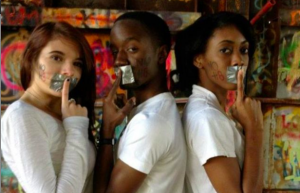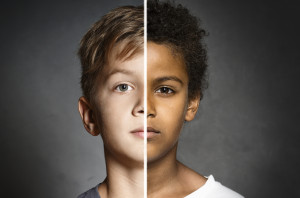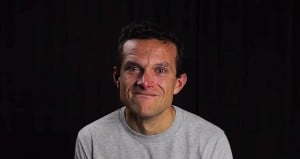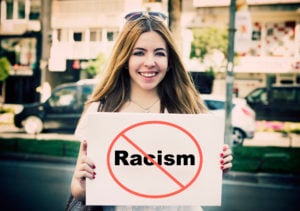
Person looking into camera with hand on neck
Refugees and migrants across the globe are desperate to cross borders to seek new possibilities for themselves and their families.
Many are interested in crossing into the United States particularly. It’s actually the top global destination for migrants and refugees worldwide.
Unstable political situations, armed conflict, scarcities in solid infrastructure and resources, and devalued currencies are just some of the motivations for refugees and migrants to travel to the U.S. as opposed to continuing to reside in their home regions.
Many white nationalists claim that Black and Brown people wishing to immigrate to the U.S. are taking away their jobs or evading taxes, but these notions are entirely undermining of the very racialized global power dynamics at play that prompt this attempted migration in the first place.
The other day, I heard the recordings of crying children who were recently separated from their parents at the southern U.S. border as a direct result of the zero-tolerance policy that U.S. Attorney General Jeff Sessions announced in early May.
It was mortifying and heartbreaking to hear as a concerned justice activist. But as a person, I realized my responsibility to the issue extended beyond just momentary pity.
I’m a second-generation Indian immigrant. My great grandfather’s employment with an intergovernmental organization helped my family to immigrate and attain citizenship to the United States, so my parents didn’t have to risk crossing the U.S. border without documentation.
The implications of this ease are vast, as are those of being born into an upwardly mobile (non-Black), legally immigrated Indian family whose primary stereotypes are that we’re nerdy, smelly, hairy, aspiring doctors…
Those of us with formal documentation in the U.S. may take our documentation status for granted but, if we do, we risk neglecting our responsibilities to issues of migrant criminalization.
All of us who have formal documentation in the destinations most desired by global migrants have to work through our own problems while also being sure to take account for our privileges.
In addition to being Indian, I’m also queer and gender non-conforming. So, I’m no model citizen, but I’ve definitely got some privileges I can take account for as opposed to fixating on the ways that society holds me back.
If you’re formally documented in a North American or European country, chances are that you can usefully leverage your privileges too. Here’s how:
1. Acknowledge your position
A first step to taking any sort of accountability is by acknowledging who you are and what you have. Doing this can be really tough sometimes, but I think a little Q and A can help us out here.
First off, are you a citizen in the United States, Germany, Canada, United Kingdom, France, or another North American or European country that is a desired destination by migrants across the world?
Second, does your documentation status state that you’re legally allowed to live and work in one of these countries permanently?
Third, do you live in one of these countries and have a fear of deportation for you or members of your family?
If you answered “yes” to one of the first two questions, then you’re formally documented in the way I’m describing in this article. If you also answered “no” to the third question, it’s likely that you won’t face the realities of migrant criminalization in the way that many do.
If you had these responses then you, like me, have a responsibility to use your privilege to address issues of migrant criminalization.
2. Be honest about your emotional and financial capacity
For lots of formally documented people, especially moderate or left-leaning millennials, a common response to hearing news of migrant criminalization is momentary shock and then desensitized neglect.
We’re used to consuming tragedies in the media then doing nothing about them for a number of possible reasons. Maybe because we’re too caught up in our own lives to concern ourselves with anything outside of them.
We need to be honest about what we can give. If that’s just attention to accurate media stories, then so be it. But it’s important to be critical about whether or not this is the case.
Often, migrants travel long distances to make money in the United States due to the global dynamics that create economic disparities between countries – particularly between majority white and majority POC countries.
Chris Boian, a spokesperson for UNHCR, told Al Jazeera that a lot of migration out of Africa toward the Americas is “driven by economics and looking for better income.”
So, while we should actively keep up with issues of migrant criminalization, we should also offer our money and resources if possible. Because our access to highly valued currencies and powerful global industries alone implies our comparative privileges to undocumented migrants (of color).
3. Give your time, attention, energy, and resources
Just like with any type of news, I think it’s important to look to the most accurate stories possible to learn about relevant issues.
People who experience the immigration system at its most violent have first-hand knowledge that contains information often neglected by mainstream media outlets and therefore have an understanding of what the most pressing issues are now.
Keep up with and donate to organizations like The Queer Detainee Empowerment Project (QDEP), Black LGBTQIA+ Migrant Project (BLMP) and UndocuMedia to support work and narratives that are formed by undocumented migrants.
And aside from this, do some research and volunteer your time to local organizations. Support community efforts to end and mitigate the harmful consequences of migrant criminalization.
The sooner we realize our responsibilities to confront issues of migrant criminalization, the sooner we can activate them and move toward collective resistance that does not overlook our unique positions and privileges.
[do_widget id=’text-101′]
Ayesha Sharma is a non-binary South Asian scholar and artist continually negotiating a relationship with themselves and their communities through practices of decolonization. They are most interested in literal and symbolic reclamation as an art practice, and investing themselves in community care. Ayesha has written for the Urban Democracy Lab and is published in ANTYAJAA: Indian Journal of Women and Social Change.
Search our 3000+ articles!
Read our articles about:
Our online racial justice training
Used by hundreds of universities, non-profits, and businesses.
Click to learn more
Most Read Articles
- « Previous
- 1
- …
- 30
- 31
- 32




















